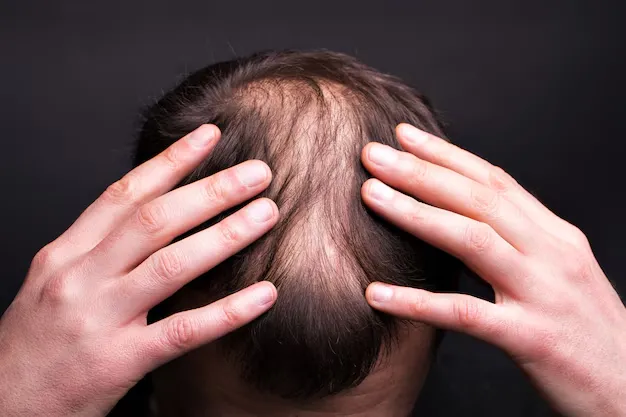Simple Answer is No, Batana Oil can’t recover bald area hair loss.
You’ve probably seen those wild before-and-after photos on social media – completely bald guys suddenly sprouting thick hair after using batana oil. The marketing makes it sound like this Honduran “miracle oil” can resurrect dead hair follicles and regrow hair where nothing has grown for decades. But here’s what the science actually says about batana oil, why some ingredients work for certain types of hair loss, and why others are complete rubbish when it comes to truly bald scalp.
Why Most “Hair Growth” Oils Can’t Actually Regrow Hair on Bald Spots
Before diving into specific ingredients, you need to understand what actually causes permanent baldness. Male pattern baldness happens when hair follicles shrink due to DHT (dihydrotestosterone) sensitivity until they eventually die completely. Once a follicle is dead and the scalp tissue has formed scar-like areas, no topical oil is bringing that back.
Research published in the Journal of Investigative Dermatology makes this crystal clear – after about seven years of complete baldness, the follicular stem cells are gone forever. The scalp tissue changes structurally, blood supply diminishes, and you’re left with essentially scar tissue where hair used to grow.
This is why hair transplant surgeons can’t just plop new follicles anywhere on a bald head. They need areas where follicles still exist, even if dormant. No oil, no matter how “miraculous,” can resurrect dead tissue or create new hair follicles from nothing.
The Ingredients That Actually Do Something (And Their Real Limitations)
Ricinus Communis (Castor Oil) – The Only One With Decent Evidence
Castor oil is probably the only ingredient in most batana oil blends that has any real hair growth research behind it. Studies show it contains ricinoleic acid, which improves blood circulation to the scalp and has anti-inflammatory properties.
A study in the International Journal of Trichology found that people using castor oil showed improved hair density after six months – but here’s the catch. This only worked on people who still had miniaturized follicles, not completely bald areas. The oil helped existing weak hairs grow thicker and stronger, but it didn’t create new hair where none existed.
The prostaglandin E2 pathway that castor oil affects can stimulate dormant follicles, but only if those follicles are still alive. Think of it like watering a plant that’s barely hanging on versus trying to grow a plant in concrete.
Zingiber Officinale (Ginger) Root Extract – Circulation Booster With Major Limits
Ginger extract increases blood flow to the scalp, which sounds great in theory. Research in the Journal of Nutritional Biochemistry shows that ginger compounds called gingerols can dilate blood vessels and improve circulation.
But here’s the problem – increased blood flow only helps if there’s something there to benefit from it. Bald scalp tissue has fundamentally different blood supply patterns than healthy hair-bearing skin. Studies using laser Doppler flowmetry show that completely bald areas have 40% less blood flow than areas with hair, and this isn’t just a cause of hair loss – it’s a result of structural changes that topical treatments can’t reverse.
Ginger might help weak, thinning hair grow better, but it’s not going to transform a chrome dome into a full head of hair.
The Ingredients That Are Basically Expensive Moisturizers
Butyrospermum Parkii (Shea Butter) and Beeswax – Good for Existing Hair, Useless for Regrowth
Shea butter and beeswax are excellent moisturizers and can make existing hair look thicker and healthier. They coat hair shafts and provide protection against damage. But when it comes to actually growing new hair, they’re about as effective as expensive hand cream.
There’s zero research showing that moisturizing ingredients can stimulate follicular activity or create new hair growth. They might make your scalp feel nice and reduce irritation, but they’re not doing anything to address the underlying causes of baldness.
Cocos Nucifera (Coconut Oil) – The Overhyped Moisturizer
Coconut oil gets crazy hype in the natural hair community, but the actual research is pretty underwhelming. A study in the Journal of Cosmetic Science showed that coconut oil can penetrate hair shafts better than other oils and reduce protein loss from existing hair.
That’s great if you have hair to protect, but it does absolutely nothing for hair regrowth. The lauric acid in coconut oil has some antimicrobial properties that might help with scalp health, but scalp infections aren’t what’s causing male pattern baldness.
The Oils That Might Help Thinning Hair But Won’t Touch True Baldness
Cucurbita Pepo (Pumpkin Seed Oil) – The DHT Blocker With Promise
This is actually one of the more interesting ingredients from a scientific standpoint. Research published in Evidence-Based Complementary and Alternative Medicine found that pumpkin seed oil contains compounds that can inhibit 5-alpha reductase – the enzyme that converts testosterone to DHT.
A clinical trial followed 76 men with mild to moderate hair loss for 24 weeks. Those using pumpkin seed oil showed 40% more hair growth compared to placebo. But – and this is crucial – the study only included men with thinning hair, not complete baldness.
The problem is that once follicles are completely gone, blocking DHT is like closing the barn door after the horses have escaped, died, and been buried for several years.
Olive Oil and Grape Seed Oil – Antioxidants That Miss the Point
Both oils contain antioxidants like vitamin E and polyphenols that can protect existing hair from environmental damage. Grape seed oil specifically contains proanthocyanidins, which some small studies suggest might stimulate hair follicles.
But the research is thin and mostly done on mice. A study in the Journal of Dermatological Science showed that grape seed extract could promote hair growth in mice, but mouse hair growth doesn’t translate to human male pattern baldness. The mechanisms are completely different.
The Ingredients That Are Pure Marketing Fluff
Essential Oils (Rosemary, Orange Peel) – Smells Nice, Does Nothing for Baldness
Rosemary oil actually has some decent research for hair growth – one study found it worked as well as 2% minoxidil for treating androgenetic alopecia. But again, this was in people with thinning hair, not complete baldness.
Orange peel oil is basically just there to make the product smell nice. There’s no research whatsoever showing citrus oils can regrow hair.
Jojoba Oil – Technical Not Even an Oil
Jojoba is technically a wax ester that closely mimics human sebum. It’s great for moisturizing and won’t clog pores, but it has zero hair growth properties. It’s essentially an expensive scalp conditioner.
Gromwell Root Extract – The Mystery Ingredient
This is often thrown into hair products because it contains shikonin, a compound with anti-inflammatory properties. Some test-tube studies suggest it might have hair growth effects, but there are no human trials and certainly nothing showing it can regrow hair on bald scalp.
Why These Products Keep Selling Despite Limited Effectiveness
The hair loss industry thrives on hope and desperation. People want to believe that a natural oil can solve their baldness without the cost and invasiveness of hair transplants or the side effects of finasteride.
Companies exploit this by showing before-and-after photos that are either heavily manipulated or show people who never had true baldness to begin with. They’ll take someone with diffuse thinning, have them use the product while also changing their lighting, camera angles, and hair styling, then claim the oil “regrew” their hair.
The ingredients in batana oil blends might help people with early-stage hair loss or thinning hair maintain what they have and possibly regrow some weak, miniaturized hairs. But if you’re dealing with a completely bald crown or receded hairline with shiny scalp visible, no combination of plant oils is bringing that back.
The laws of biology don’t care about marketing claims or customer testimonials. Dead hair follicles stay dead, and no amount of wishful thinking or expensive oil is changing that fundamental reality.

